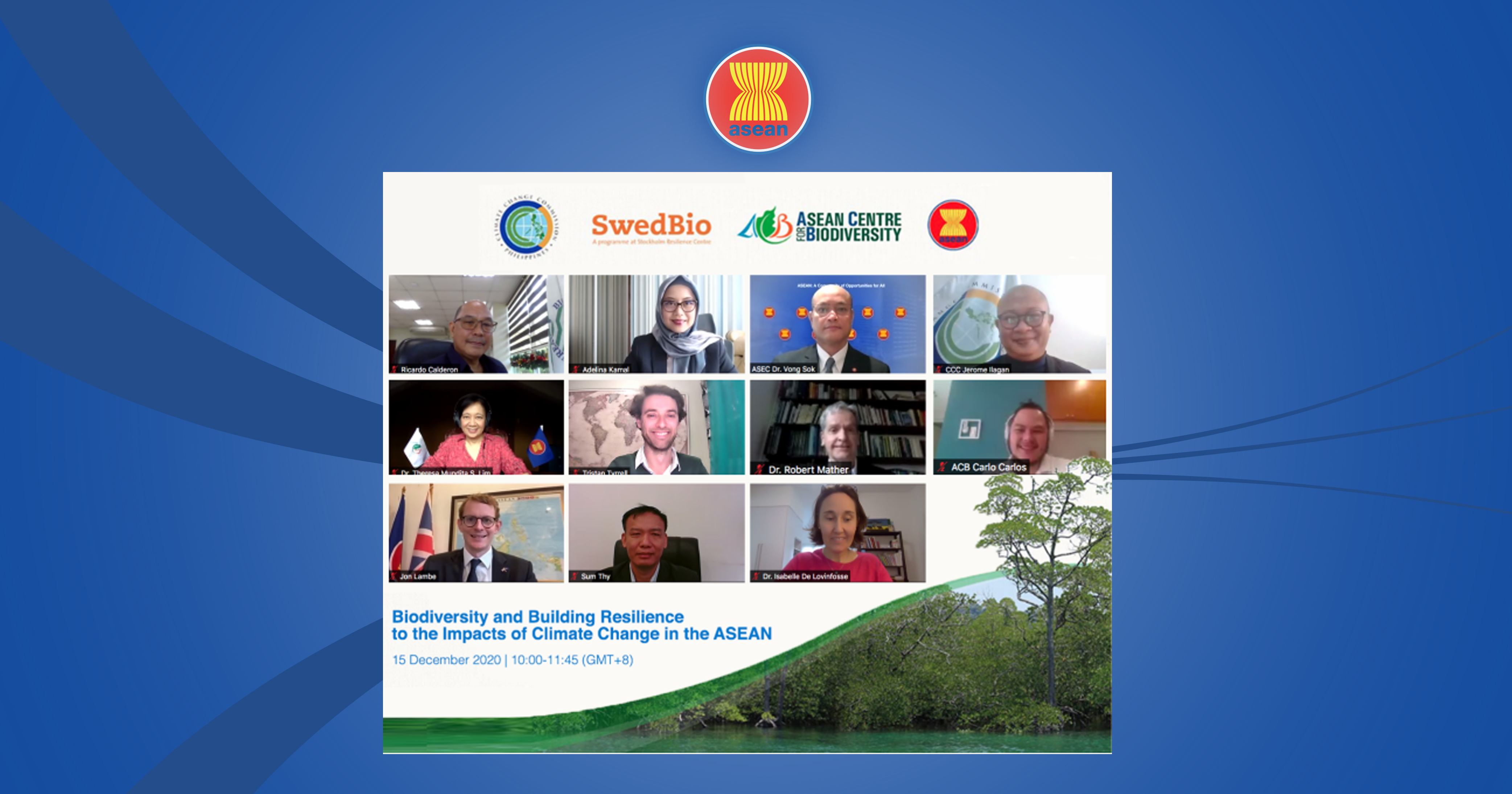
MANILA, 19 December 2020 - The ASEAN Centre for Biodiversity (ACB) and the Philippines Climate Change Commission held the Biodiversity and Building Resilience to the Impacts of Climate Change in the ASEAN webinar on 15 December, coinciding with the 5th anniversary of the Paris Agreement.
The event sought to highlight the need to incorporate nature-based solutions as part of the approach in addressing climate change. The webinar, supported by Swedbio, a programme from the Stockholm Resilience Centre, gathered a diverse panel of experts who shared their perspectives and insights on biodiversity and nature s role in building resilience against the climate crisis.
Climate change is one of the main culprits that drive the loss of nature, stated ACB Executive Director Dr. Theresa Mundita Lim, recalling the recent climate-related disasters that hit several ASEAN Member States (AMS). However, the main paradox here is that biodiversity and its ecosystem services underpin our principal solutions and efforts to tackle climate change and its impacts. Without a healthy biodiversity, our fight against climate change would be an impossible feat, she concluded.
The discourse on nature-based solutions, as well as the ecosystem-based approach to climate change adaptation, has been gaining more ground in the light of the current ecological and health crises.
The panelists noted the discussion s relevance as the global community is developing post-2020 biodiversity targets. The upcoming Fifteenth Conference of Parties of the Convention on Biological Diversity and the 26th Conference of the Parties to the UN Framework Convention on Climate Change will take place in 2021.
Tristan Tyrrell, programme officer of SwedBio at the Stockholm Resilience Centre, highlighted that recent reports are showing that trends are going in the wrong way when it comes to climate change , as the gaps between commitments and action to achieve the Paris targets of reducing greenhouse gases (GHG) emissions are widening.
As devastating as the impacts of COVID-19 have been, some scenarios suggest that it will have a positive impact in terms of global GHG emissions, Tyrrell said. We could use this opportunity as what has been called, the great reset , to ramp up positive ecosystem-based actions in climate change adaptation and mitigation.
On her part, Dr. Isabelle de Lovinfosse, head of Southeast Asia COP26 of the British High Commission Strategy, mentioned that as the world recovers from the coronavirus pandemic, we owe it to future generations to base our recovery on solid foundations, including a greener, more resilient, and inclusive global economy.
Appropriate and effective national policies and programs on climate actions are central to building resilience. In a recorded presentation, Dr. Nagulendran Kangayatkarasu, deputy secretary general of Malaysia Ministry of Environment and Water, discussed how Malaysia has prioritised their Nationally Determined Contributions and how they are working towards them through supporting various adaptation measures.
In Indonesia, Krissusandi Gunui, executive director of Institut Dayakologi, shared that the knowledge and wisdom of indigenous peoples and local communities are significant in strengthening climate change adaptation and biodiversity conservation.
Deputy Secretary-General of the Cambodian National Council for Sustainable Development Sum Thy, along with Dr. Robert Mather of the Biodiversity Conservation and Management of Protected Areas in ASEAN, and Executive Director Adelina Kamal of the ASEAN Coordinating Centre for Humanitarian Assistance on disaster management took part as reactors.
The reactors highlighted the need for collaboration and cooperation across sectors. Deputy Secretary-General Sum Thy urged for closer coordination between the ASEAN Working Groups on Climate Change and Nature Conservation and Biodiversity. Cooperation at such a level might be helpful in addressing the barriers to promoting and implementing nature-based solutions which, noted by Dr. Mather, are interlinked.
ASEAN has since been pushing for more cross-sectoral and cross-pillar cooperation to advance biodiversity as response to climate change and in preventing future pandemics.
As we recognise our common but differentiated responsibilities, ASEAN, through its sound leadership and structures such as the ASEAN Senior Officials on the Environment, and sectoral bodies, strives to promote the robust cooperation and joint actions towards our commitments to biodiversity and in building resilience to climate change, said Dr. Vong Sok, Head of the Environment Division of the ASEAN Secretariat.
He also called on all biodiversity and climate change actors and partners to create more synergies between biodiversity conservation and climate action so as to build back better for the future.
Chief, Policy Research and Development of the Philippines Climate Change Commission Jerome Ilagan moderated the webinar. UK Ambassador to ASEAN Jon Lambe, Philippines Department of Environment and Natural Resources Assistant Secretary Ricardo L. Calderon and participants from various AMS and sectors, including students and conservationists, attended the webinar.
The full recording of the webinar may be accessed at https://fb.watch/2ptCr4mVWL/.






